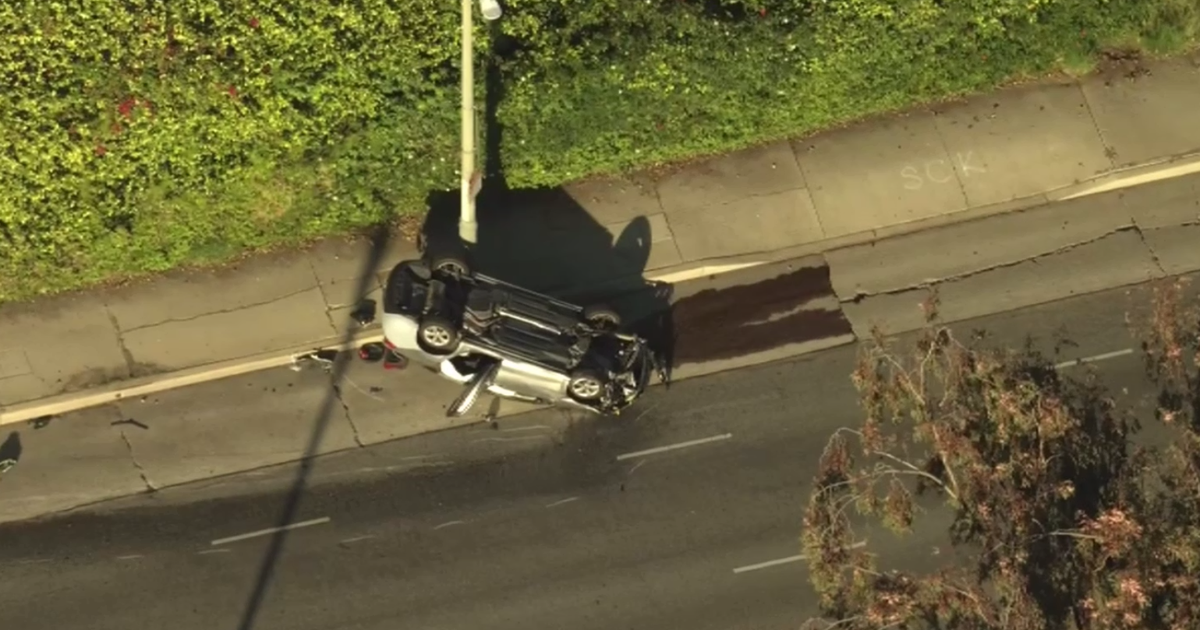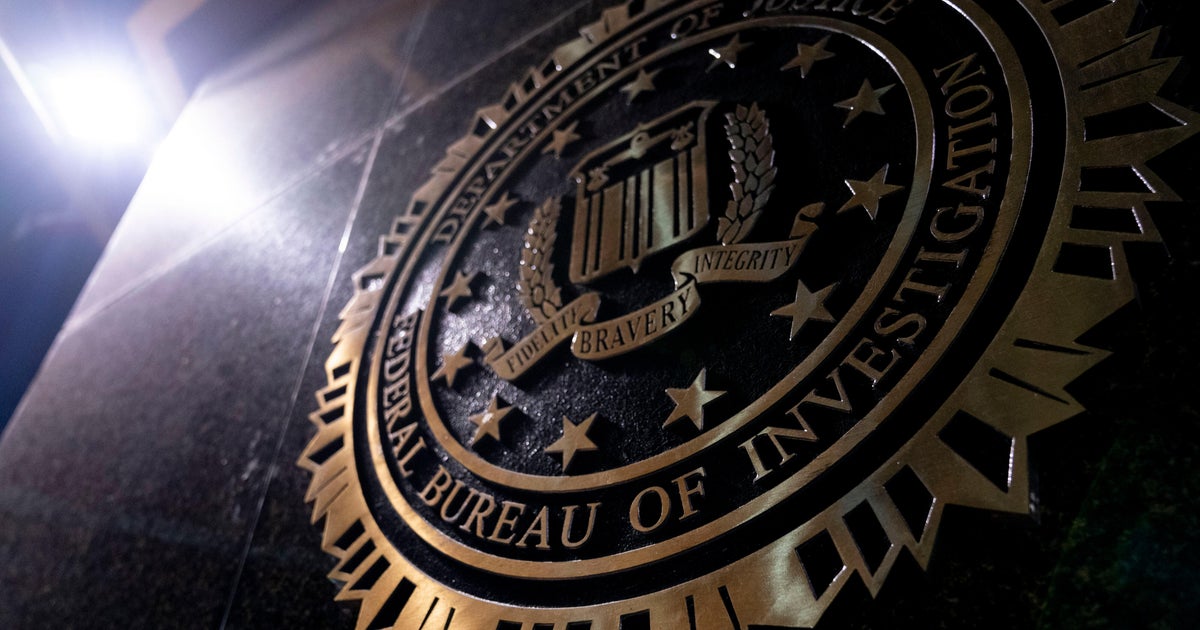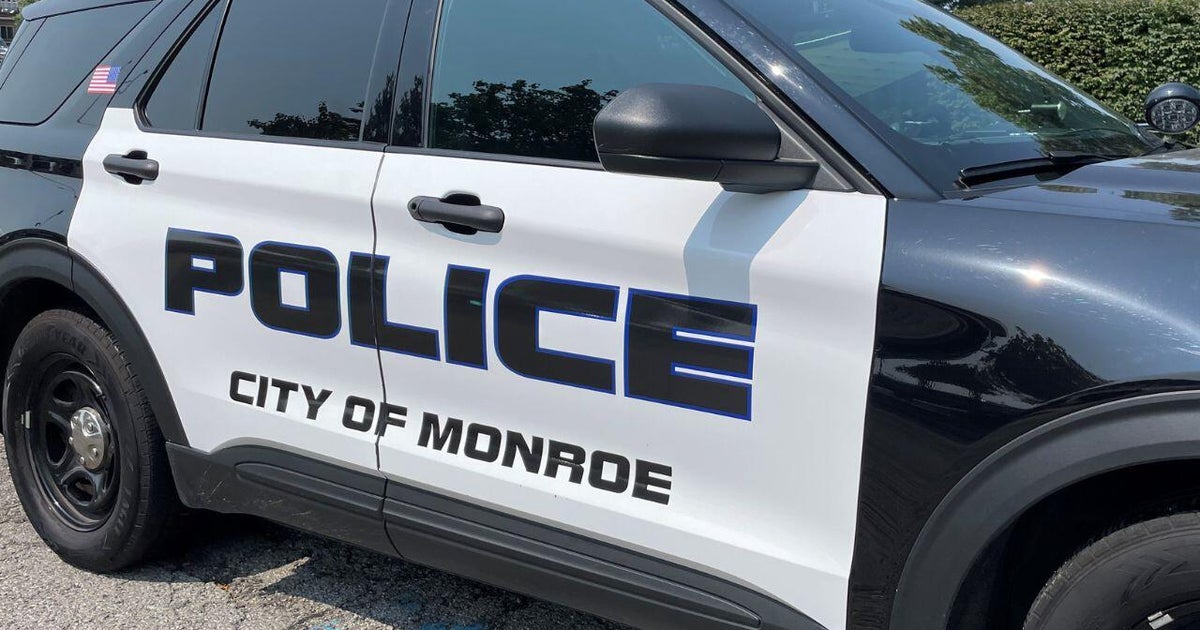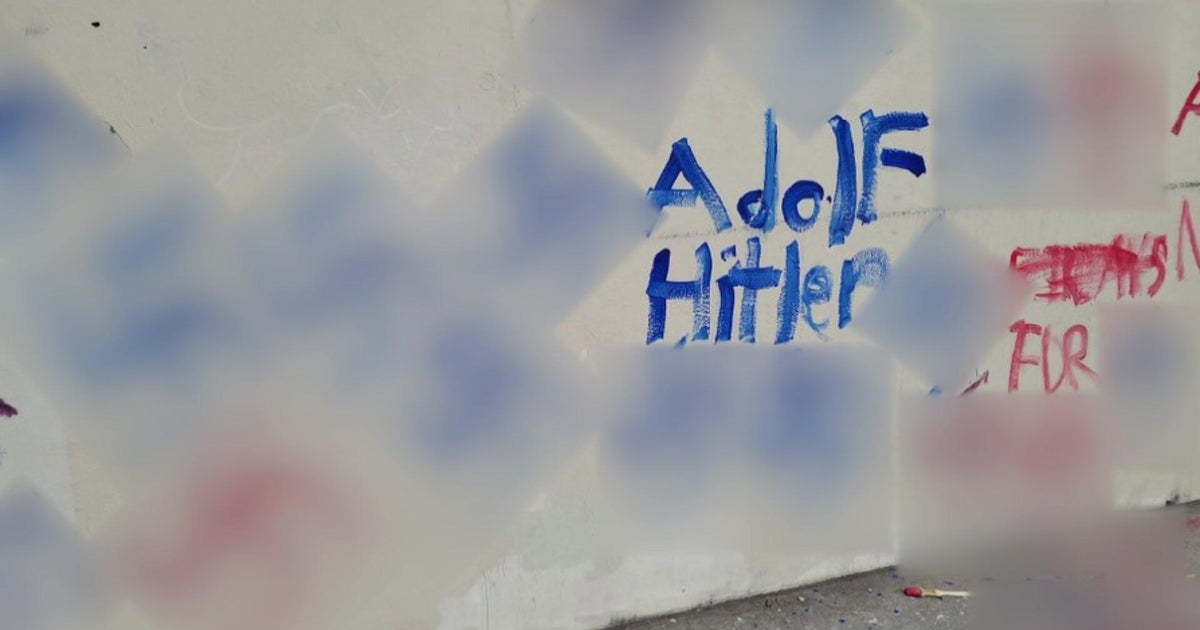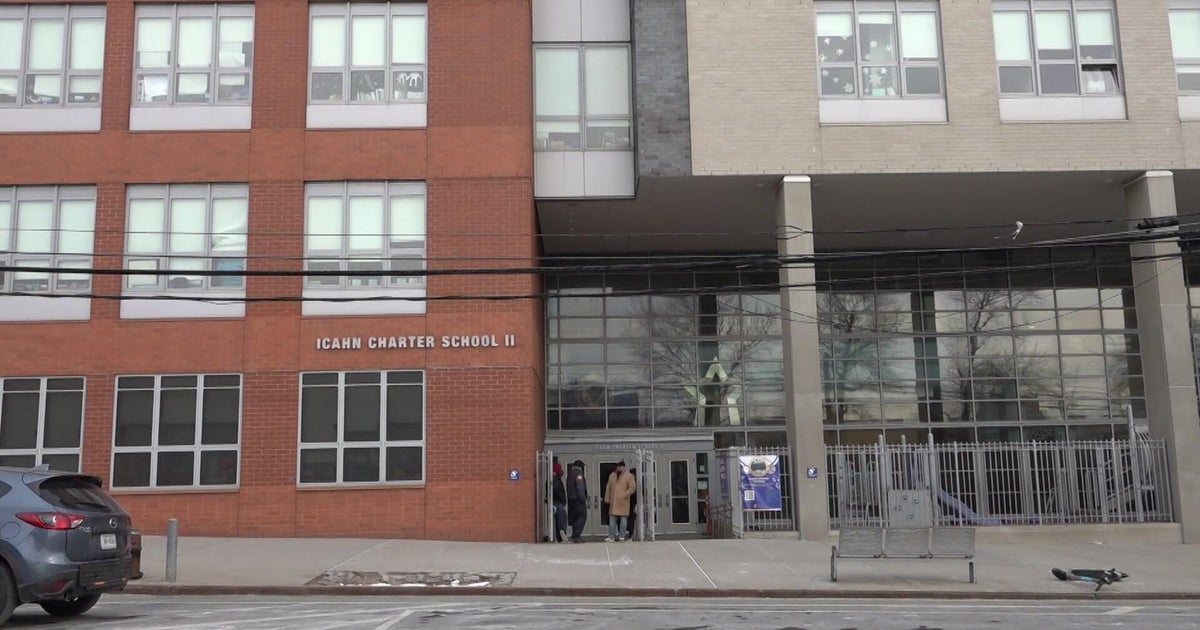"An overreach:" UIC Police arrest Palestinian student for marking campus property with messages supporting Palestine, video shows
CHICAGO (CBS) -- A Palestinian American student was handcuffed, arrested inside her classroom, kept in a holding cell for hours, and charged with criminal defacement for marking up property with messages supporting Palestine around the University of Illinois Chicago campus.
Ultimately, the charge was dismissed, and the university gave the student a warning, according to emails obtained by CBS Chicago. But she and faculty familiar with the incident believe what happened before, during, and after the arrest was an overreach by the university. And had it not been for her identity and what she wrote, they said, she wouldn't have been arrested.
"It should not have even gotten to that point," said the student, who asked we conceal her identity for safety reasons.
While UIC is currently under federal investigation by the U.S. Department of Education for allegations of discriminating against Palestinian students, a CBS Chicago investigation found the student is the only person who has been arrested for defacement on campus in years.
'Am I being arrested?'
CBS Chicago's review of police records, calls, surveillance footage, and more than two hours of body camera video paint a picture of what happened the morning of Nov. 14, 2023. It was 10:20 a.m., and a staff member of university facilities management called UIC Police.
The man said he saw a woman vandalizing multiple university-owned poles and signs with a black marker, according to the report. In part, he described her as wearing a "headdress," or a hijab, with a green, white, and black scarf tied to her bookbag.
"Just saw a student writing, I guess, vandalism over at 619 in between the two buildings – you know, the breezeway," he told police over the phone.
"Female with a thing, like a headdress thing on," he continued. "She's got a backpack on her with lanyards hanging off the back of it."
The man followed her and took photos as she wrote messages like, "Free Palestine," and "UIC silences Palestinians." One message written on a metal door said, "You can't erase Palestinians & our struggle for freedom." She also drew small Palestinian flags.
In an interview with CBS Chicago, the student, who's also Muslim, acknowledged she wrote the messages 10 times around campus after feeling frustrated with university administration since the war in Gaza began three months ago.
On Oct. 11, University of Illinois System President Timothy Killeen released a statement on UIC's website. It condemned the attacks by Hamas on Oct. 7, which killed 1,200 Israelis, but many students and faculty felt the university failed to use the same strong language against Israel for killing nearly 1,000 Palestinians at the time.
"They sent out an email in the first week that completely left us out and made us feel we weren't valid in our fight for freedom over the last 75 years," she said, referring to Palestinians living under Israeli occupation.
"My writings were always fueled by the frustration and just the, I guess, pure sadness that I felt that someone wouldn't even have the compassion and empathy to acknowledge the suffering that is happening, solely because the people who are suffering are Palestinian," she said.
For weeks she and other students first attempted "silent" forms of protest, she said, including putting up fliers around campus. But they were repeatedly removed, while other posters stayed up.
Students have also held protests on campus, rallying against the university's decision to invest in programs connected to Israel.
"With all of our posters and our protests being either ignored, silenced, or censored, I felt that the 'UIC silences Palestinians' was something that was a fact," she said.
So she turned to a permanent marker to make her point. And on Nov. 14, after writing "Free Palestine" and drawing a small Palestinian flag on a door inside, she headed to class. Surveillance video shows the staff member of facilities management crossing the street to follow her before she enters the building.
About 20 minutes after the first call came in, at 10:43 a.m., the student was in her classroom waiting for class to start when two UIC police officers walked in and asked for her ID. She didn't know she was about to be arrested. She also didn't know two additional officers were waiting outside the classroom with the witness.
"And the police officers – there was another one outside the room," she said. "So, there were at least three police officers there, which I felt like from the beginning was, wow – that's a lot for whatever this is about."
One officer asked the witness whether he was "100 percent positive" that she was the student who wrote the messages.
"One hundred percent positive – that's the tag I saw on the backpack as well," the witness said.
The officer then turned to the student, the body camera shows.
"OK, so we're stopping you because someone observed you writing stuff in permanent marker on university property, OK?" the officer said. "So unfortunately, if it was chalk, it could be washed off but unfortunately it's permanent marker, OK?"
The officer asked the student to stand up.
"Am I being arrested?" the student asked.
"Yes, yeah. Yes, you are," the officer responded.
The officer then instructed the student to put her hands on the wall and spread her legs as they searched and handcuffed her.
At one point before she was arrested, a member of the police department ordered the arresting officers over radio dispatch to make the arrest.
"If we do find the person, and we do confirm the person," he said, "I want this person locked up."
"And so it was decided at that moment, at 10:20 a.m., that the police were going to do their best to lock up this person," said Nicole Nguyen, an associate professor of criminology, law, and justice with UIC. She also filed several Freedom of Information Act requests with UIC Police to piece together the incident.
"And to me, that's a shocking and really terrifying moment, because it means the university has agreed that locking up a student for graffiti is a proper response," Nguyen said.
As police walked the student out of the classroom with her hands behind her back, she said she was humiliated in front of her peers and professor.
"And they not only handcuff me in my classroom, they make a show, essentially, in my eyes," she said. "Dragging me out in front of my friends, my classmates, and my professor. And they have this whole thing putting me in the cop car in front of the building. And the entire time I'm thinking like, was there any justifiable reason for all of this force, for a marker?"
As the student sat handcuffed in the backseat of the police cruiser, body cameras recorded an officer saying, "I don't believe this will take very long, OK?"
Accusations of selective enforcement
More than 33,000 students make up UIC's campus. The university's Arab American Cultural Center estimates approximately 9 to 10 percent of students are Arab American, or between 3,000 and 4,000 people.
The center's program coordinator, Nesreen Hasan, said so many of them are grappling with trauma from the killings in Gaza.
"It just breaks my heart that my students are grieving," Hasan said. "I have students who have family in Gaza. I have a student that lost 10 members of her family that were killed in one airstrike."
But many Palestinian students feel the university has not done enough to support them – both before and after Oct. 7. CBS Chicago uncovered two complaints – one from 2022 and another from last year – filed against UIC by students with the U.S. Department of Education Office of Civil Rights (OCR).
The complaints accuse the university of anti-Palestinian discrimination, including censorship and creating a hostile environment. The 2022 complaint prompted the OCR to open a federal investigation into UIC in December.
So when Hasan and Nguyen heard a Palestinian and Muslim student was arrested by UIC Police on Nov. 14, they and other faculty rushed to the police station to support her.
"I was scared for her," Nguyen said. "I was worried for her, and thought the one thing that I can do is show up and advocate for her; to use my privilege as a faculty member to do those things on her behalf."
Nguyen said in her decade at UIC, she has never seen the university take similar steps in other graffiti cases.
"As a faculty member, I see graffiti all over campus – and it's queer pride graffiti, it's homophobic graffiti, it's 'Tina loves Tom' graffiti – and we know that for the most part, this doesn't get reported as criminal activity," she said.
In many cases, that's true.
Data obtained by CBS Chicago shows since 2021, there were 120 incidents of criminal defacement reported to UIC Police. And in recent visits to the campus, there were several locations that had some form of defacement on them, including graffiti and markings on signage, garbage cans, benches, poles, and more. CBS Chicago even found other graffiti – like stickers and markings – in some of the same locations where the student used a marker.
In addition, Abdallah Altamimi, the cultural engagement educator with the university's Arab American Cultural Center, provided photos of other messages he discovered in the bathroom of Taft Hall after Oct. 7.
"Gaza = tent city very very soon," one message said.
"F*** Palestine, F*** terrorism, F*** Hamas," said another.
Despite previous reports and several messages observed on campus, CBS Chicago's review of UIC police records show only one person has been arrested for criminal defacement: the Palestinian-American student, according to the latest available data as of Nov. 22, 2023.
"It's the message that's being criminalized," Nguyen said. "It's the message that's being policed and monitored."
Nguyen also believes the student's identity – her wearing the hijab and Palestinian scarves like the kufiyyeh – played a role in her arrest and how she was treated.
"I think her visible identity, combined with what she was doing, allowed for and even encouraged the UIC employee to follow her for several blocks and to photograph and video her – and also then justify detaining her for the entire day," she said.
After the student was brought to the police station, body camera shows an officer searched her again and put her in a holding cell at around 11 a.m. She remained in the cell for at least five hours, until sometime after 4 p.m., according to police records. She was then taken to the Metra Police Department to be fingerprinted and had her mugshot taken.
"When it became very obvious that they were going to be dragging this out for as long as they possibly could, I was thinking about like, what am I going to tell my dad?" the student said. "What am I going to tell my mom? Why is this taking so long? What am I going to tell my professors for missing class?"
Conversations between several police officers in the body camera video raise questions about the severity of the charge pursued against the student, and whether that led to confusion and the delay in her release. Police appeared to go back and forth between charging the student with a felony versus a misdemeanor.
The body camera video only recorded the conversations between the officers – not who made the final decisions.
One officer said initially the charge "was supposed to be felony" and "got bumped down to a misdemeanor" after a Cook County assistant state's attorney didn't approve it.
"'Cause we changed it from the felony to a misdemeanor," an officer said. "So it might need to be approved again."
According to the video, officers at one point are even heard questioning whether the situation called for this sort of police response.
"Once it was a misdemeanor, I was like, oh, can't we just cut her from the station?" one officer said.
"Not a violent offense. Not a flight risk," another officer responded.
"So I'm like, yeah, just f******… now we got to sit in this," the first officer said. "It's a pain in the a**."
"So, we can see that even from a police officer's perspective, this response was unnecessary and didn't make any sense," Nguyen said. "So I think for me, it really confirms that this was an overreach by the institution; it was an overreach by the police officers in charge – to the point that the police officers don't understand what it is that they're doing."
It's unclear who pursued the felony charge and why. The Cook County State's Attorney's Office did not respond to CBS Chicago's requests for information. Through a spokesperson, UIC Chancellor Marie Lynn Miranda denied CBS Chicago's request for an interview about the arrest. The university also did not answer emailed questions asking about other defacements on campus.
The spokesperson provided a statement that said:
"UIC acknowledges that our community continues to experience pain and anguish resulting from the Middle East crisis. We are continuing to engage with groups of students and faculty about the impact of the complex reality of the ongoing conflict between Israel and Palestine. Working with UIC community members with varying perspectives and experiences, we will continue to uphold our values of inclusivity, tolerance, and respect for one another to ensure all can live, learn, and work together in a safe and welcoming environment."
Hasan said she was "fuming" when she learned a felony charge was being considered against the student.
"She didn't break a window or anything. She didn't burn anything," Hasan said. "And for them to put a felony charge, knowing that this could destroy her life? Like a felony is always on your record. This could destroy this young woman's life. But they didn't care. And so if they didn't care, that means they didn't see her as a student. That means they didn't have empathy for her."
Police eventually took the student's mugshots and fingerprints, and she was released six and a half hours after she was arrested, video shows. She was officially charged with a misdemeanor for criminal defacement of property.
Charge dismissed
With an impending criminal court case, the UIC senior set to graduate in May said she struggled to concentrate on studying for finals. She also had professors and friends walk her to classes because she was scared for her safety.
"I wasn't paying attention, I wasn't taking notes, I was just going, 'Oh my God, what am I going to do?' This is devastating," she said. "...And I'm sitting here like, what's the point of going to class, what's the point of going out and going to classes when a random person can follow you, call the police on you, and have the police officers drag you out in front of your classmates and friends?"
On Nov. 27, the student attended a UIC administrative hearing over Zoom to discuss a formal disciplinary complaint filed against her in connection with the defacement charge. During the hearing, she said she tried to help administrators understand the root causes of her frustration that led to her actions.
"I talked about who I was as a student and that this wasn't done with malicious intent, and that I was frustrated that our voices kept being dismissed and erased, and I felt that this was something that really went overboard," she said.
That same day, she received an email from UIC, saying the university decided to issue her a warning. A week later, on Dec. 5, court records show the criminal charge was dismissed.
Nguyen believes the university could've responded differently from the beginning. Rather than arrest the student, she said administrators could've met with her to try and understand her concerns, while still holding her to the defacement.
"So, is it that she washes off the graffiti, for example? Is it she hosts some kind of teach-in that examines the experiences of Palestinian students on campus so that she has an opportunity to express herself, and that university administrators have something to learn from her?" she said.
Nguyen continued: "I think there's a number of different ways that we can sort of recognize the mistake that was made and to hold her accountable for that mistake – but also to say this mistake comes from somewhere, and we have the responsibility as a university to address the conditions and context in which that mistake was made."
The student said she is still feeling the ramifications of the arrest. In December, one of her fears became a reality when she was denied a job opportunity due to the charge showing up on a background check, emails show.
"What are the academic consequences, what are the personal, professional consequences of being someone who, out of pain, out of feeling invisible, wrote 'Free Palestine?'" Nguyen said. "Should the costs of a mistake be she never gets a job, that she can't pass her classes, that her peers think of her in a different way? Should those be the consequences of using a marker on a university building?"
And with the pending federal investigation into UIC, the student said incidents like these damage the university's relationship with its students.
"My relationship with UIC was already not very good after the email that they sent out that completely disregarded Palestinians on campus," she said. "It was already very bad. And now, I have little respect for the university anymore."














